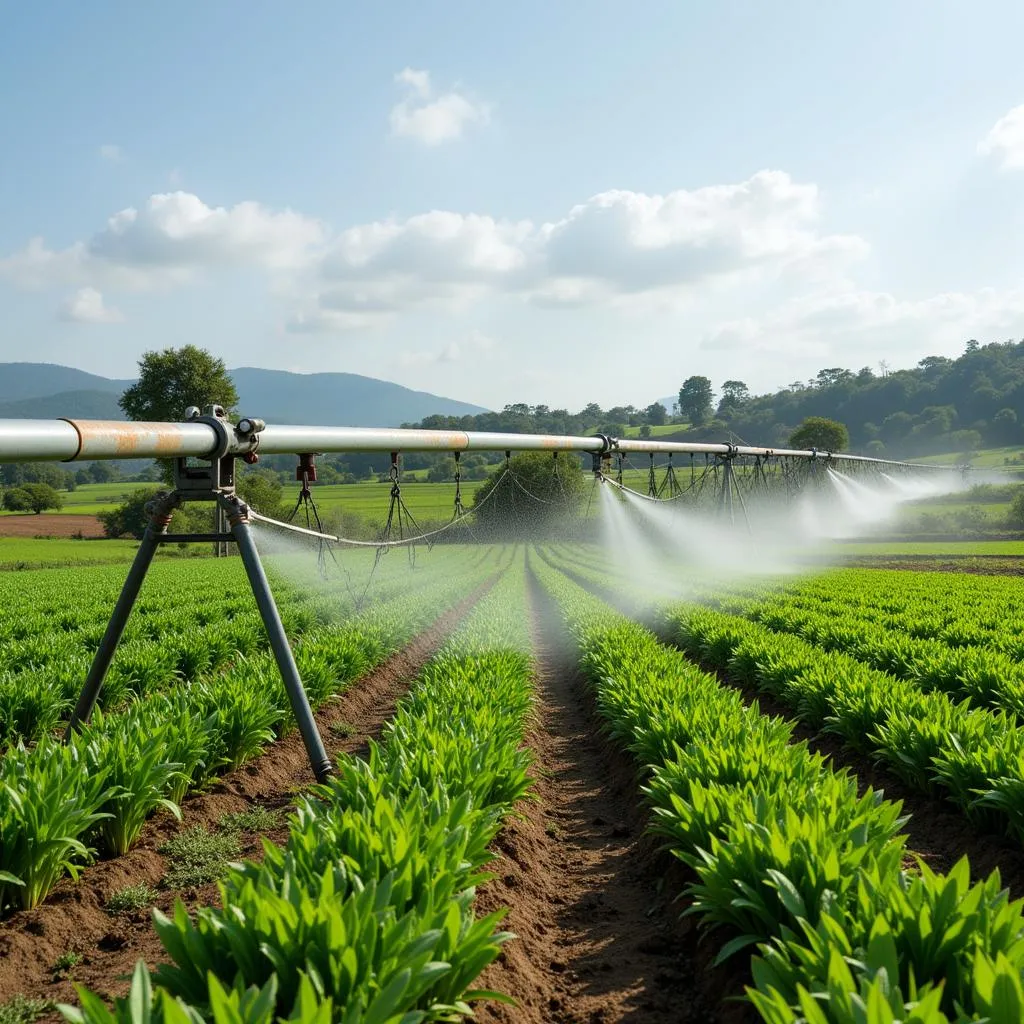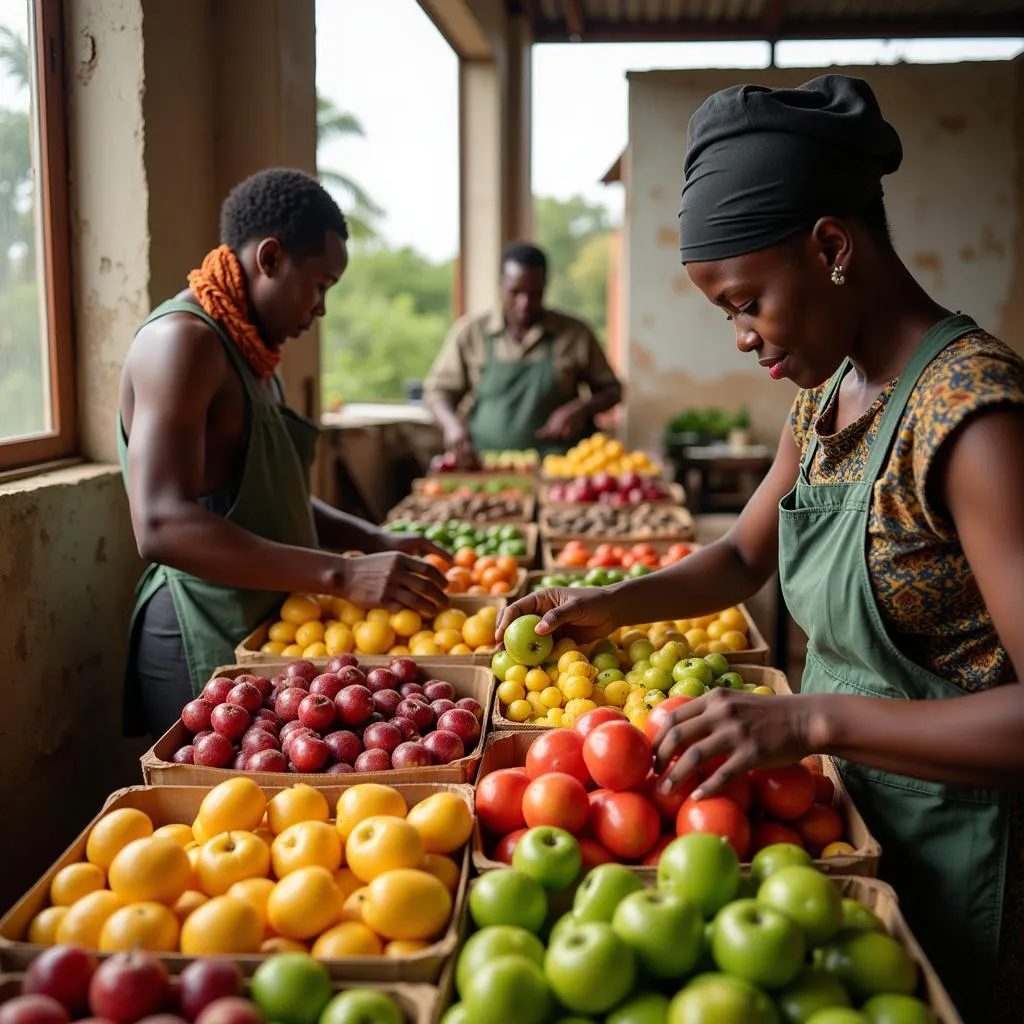Exploring the Landscape of African Agricultural Exports
African Agricultural Exports play a pivotal role in the continent’s economy, contributing significantly to employment, foreign exchange earnings, and overall development. From the fertile plains to the sun-drenched savannas, Africa is endowed with a diverse range of agricultural products that are in high demand globally. This article delves into the world of African agricultural exports, examining the key products, challenges, and opportunities shaping this vital sector.
A Continent Ripe with Potential: Key Agricultural Exports from Africa
Africa possesses immense agricultural potential, with vast tracts of arable land and a favorable climate for a wide variety of crops. Some of the key agricultural exports driving the continent’s economic growth include:
- Cocoa Beans: West Africa, particularly Côte d’Ivoire and Ghana, dominates the global cocoa bean market. Chocolate, a beloved treat worldwide, owes its rich flavor to these beans.
- Coffee: Ethiopia, known as the birthplace of coffee, continues to be a major exporter of high-quality Arabica beans. Other key coffee producers include Kenya, Uganda, and Tanzania.
- Fruits and Vegetables: From the juicy citrus fruits of South Africa to the flavorful avocados of Kenya, Africa boasts a wide array of fruits and vegetables. These exports are finding their way onto supermarket shelves worldwide.
- Nuts: Cashews from Tanzania, peanuts from Senegal, and macadamia nuts from South Africa are just a few examples of the diverse nut exports originating from the continent.
- Flowers: Kenya is renowned for its vibrant flower exports, particularly roses. The country’s high-altitude farms provide ideal growing conditions for these delicate blooms.
- Tea: Kenya is also a leading exporter of tea, known for its robust flavor and rich aroma. Other key tea producers include Malawi, Rwanda, and Tanzania.
 African Farmers Harvesting Tea Leaves
African Farmers Harvesting Tea Leaves
Navigating the Challenges: Obstacles Facing African Agricultural Exports
Despite its vast potential, the African agricultural export sector faces numerous challenges that hinder its growth and competitiveness in the global market. These challenges include:
- Limited Infrastructure: Inadequate transportation, storage, and processing facilities result in significant post-harvest losses and reduce the quality of products reaching the market.
- Access to Finance: Many smallholder farmers struggle to access the necessary capital for investment in improved inputs, technology, and infrastructure.
- Climate Change: Extreme weather patterns such as droughts and floods pose a significant threat to agricultural productivity and can severely impact yields.
- Market Access: Tariff barriers, non-tariff measures, and stringent sanitary and phytosanitary regulations often restrict African agricultural exports from accessing lucrative international markets.
 Modern Irrigation System on an African Farm
Modern Irrigation System on an African Farm
Seizing the Opportunities: Unlocking the Potential of African Agricultural Exports
Despite the challenges, the future of African agricultural exports is brimming with opportunities. By addressing the existing constraints and leveraging emerging trends, the continent can unlock its full agricultural potential and transform its economy. Some key opportunities include:
- Value Addition and Agro-processing: Moving beyond the export of raw commodities and investing in value addition through processing and manufacturing can significantly increase export earnings and create employment opportunities.
- Organic and Sustainable Farming: Growing consumer demand for organic and sustainably produced food presents a significant opportunity for African farmers to tap into premium markets.
- Technology Adoption: Precision agriculture, mobile technology, and data analytics can revolutionize farming practices, improve efficiency, and enhance productivity.
- Regional Integration: Strengthening regional trade within Africa can boost intra-African agricultural trade and reduce reliance on volatile international markets.
What are the Top 5 Agricultural Exports from Africa?
While the continent boasts a diverse range of agricultural products, the top 5 exports in terms of value are:
- Cocoa Beans
- Coffee
- Fruits and Vegetables (including avocados, citrus fruits, mangoes)
- Nuts (including cashews, peanuts, macadamia nuts)
- Tea
These exports play a crucial role in generating foreign exchange earnings and supporting livelihoods across the continent.
How does Climate Change Impact African Agricultural Exports?
Climate change poses a significant threat to African agriculture, with increased frequency of extreme weather events such as droughts and floods. These events can decimate crops, reduce yields, and disrupt supply chains, ultimately impacting export volumes and earnings.
 African Entrepreneurs Packaging Processed Fruits
African Entrepreneurs Packaging Processed Fruits
What is the Role of Technology in Enhancing African Agricultural Exports?
Technology has a transformative role to play in boosting agricultural productivity and enhancing the competitiveness of African exports. Precision agriculture, for instance, enables farmers to optimize inputs and resource use, while mobile technology facilitates access to market information and financial services.
Conclusion
African agricultural exports are poised for a future of growth and diversification. By addressing the challenges of infrastructure, access to finance, and climate change, while capitalizing on opportunities in value addition, technology, and regional integration, Africa can harness its agricultural potential to drive sustainable economic growth and improve livelihoods across the continent.
FAQs
- What are the main destinations for African agricultural exports? The European Union, China, and the United States are among the top destinations for African agricultural exports.
- What are some initiatives aimed at promoting African agricultural exports? The African Continental Free Trade Area (AfCFTA) aims to boost intra-African trade, while initiatives like the Comprehensive Africa Agriculture Development Programme (CAADP) focus on increasing agricultural productivity.
- What is the role of smallholder farmers in African agricultural exports? Smallholder farmers play a crucial role, accounting for a significant portion of production for many key exports.
Need More Information?
Explore more about:
For any assistance, please contact us:
- Phone Number: +255768904061
- Email: kaka.mag@gmail.com
- Address: Mbarali DC Mawindi, Kangaga, Tanzania
Our customer service team is available 24/7.



